Howard Andrew Jones's Blog, page 59
March 28, 2014
Genre Prejudice
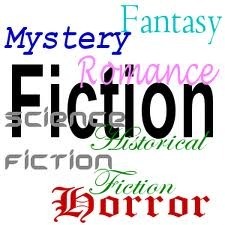 It’s a lot easier for me to be generous about other genres than it used to be. I’m trying to decide if that has something to do with me mellowing with age, or if it’s because there’s a whole lot more sword-and-sorcery available than there was ten years ago … or if it’s simply that I don’t feel shut out anymore now that I’m writing sword-and-sorcery stories for a living.
It’s a lot easier for me to be generous about other genres than it used to be. I’m trying to decide if that has something to do with me mellowing with age, or if it’s because there’s a whole lot more sword-and-sorcery available than there was ten years ago … or if it’s simply that I don’t feel shut out anymore now that I’m writing sword-and-sorcery stories for a living.
Fantasy seems a lot more popular even among the mainstream readers than it used to be, although the dividing line between fantasy and sword-and-sorcery still seems pretty blurry. I’ve spent a lot of time over the years trying to define the difference, but I often feel like I’m shouting in the wind. The common conception remains that if it’s got swords and magic, it must be sword-and-sorcery, regardless of pacing or the focus of the plot. But let’s set another discussion of sword-and-sorcery aside for the nonce and focus instead on genre prejudice.
I think a lot of science fiction and fantasy writers and readers feel like low faces on the totem pole because their favorite fiction is sneered at by people in the know. A while ago, I started to realize that MOST writers felt like their genre was being kicked to the curb. Horror writers have been going through a hard time now for a good long while. YA writers, well, they “only write YA,” and God help the urban fantasy people, whom are in fashion to be hated. As writers and readers, we all turn up our noses at all the things we find wrong with some one else’s genre. Really, that’s all that’s happening with the literary criticism of genre work. It’s easy for us genre people to detail the things we find annoying about literary fiction, but it turns out lit fic writers feel harried themselves.
When you enjoy a genre — like historical fiction or sword-and-sorcery — there logically must be some aspect of the genre that you like. And there likely are some aspects that others would cite as weaknesses that you either don’t notice or are willing to tolerate. As much as I love the fiction of Robert E. Howard, for instance, I will freely admit that there are few engaging female characters in the vast majority of his fiction. And I must also admit that while the prose may be beautiful, even when it’s grotesque, it’s really not about slow, measured consideration. That’s fine with me a lot of the time, though I wouldn’t want to read it all the time.
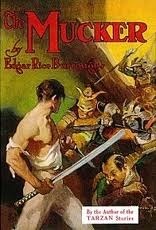 Because I read a lot of older genre fiction, I am used to having to forgive racial and social conventions that make me wince. These attitudes come from the time and region of the writer, thus it always seems fairly absurd to criticize standard outlooks of the time that the writer shared. For instance, recently I discovered more than a share of cringe-worthy attitudes about Mexicans and Japanese on the part of some characters in an Edgar Rice Burroughs novel titled The Mucker. Yet looking past that, the novel was surprisingly good. Its second installment (The Return of the Mucker) was far more pulpy than the first; I still enjoyed it, but not as much, for while I have a toleration for pulp, there is a limit to how much coincidence, damsel-in-distress saving, and heroes being knocked unconscious and captured I can endure before I toss a book aside. Other readers have no trouble tolerating any of those issues, but can’t accept the conventions of urban fantasy where vampires are sometimes good guys, or can’t tolerate the technical discussions in hard science fiction.
Because I read a lot of older genre fiction, I am used to having to forgive racial and social conventions that make me wince. These attitudes come from the time and region of the writer, thus it always seems fairly absurd to criticize standard outlooks of the time that the writer shared. For instance, recently I discovered more than a share of cringe-worthy attitudes about Mexicans and Japanese on the part of some characters in an Edgar Rice Burroughs novel titled The Mucker. Yet looking past that, the novel was surprisingly good. Its second installment (The Return of the Mucker) was far more pulpy than the first; I still enjoyed it, but not as much, for while I have a toleration for pulp, there is a limit to how much coincidence, damsel-in-distress saving, and heroes being knocked unconscious and captured I can endure before I toss a book aside. Other readers have no trouble tolerating any of those issues, but can’t accept the conventions of urban fantasy where vampires are sometimes good guys, or can’t tolerate the technical discussions in hard science fiction.
Lately, I’ve been wandering out of the fantasy province to read some westerns, a field I’d carefully avoided and now find of great interest for a variety of reasons. I always used to hear pro writers saying to read outside the field and I used to nod knowingly, because I was always reading history books. I felt like I “got it.” Now, though, as I absorb detail after detail about Indian archery and wilderness survival and horse handling from a genre I used to think would be dull as dirt and full of cliche (really, don’t they all have their cliches and conventions?), I truly get it, and wonder how I could have convinced younger Howard to read this stuff sooner. Or to look past sparkly vampire prejudice to see some sparkly dialogue between Bella and Edward. Or to try out some mysteries to see how to build a case or some noir atmosphere.
I don’t think I’m ready to read every genre, or ever will be. Some continue to bore or irritate me, and a few disgust me. But I get now that it’s not that my favorite fiction is better than yours, just that my fiction works for me better than yours does for me. Good, bad, maybe it’s all just perception. I’ve grown a little more willing to try something without thinking it will taste icky just because it’s green. Vegetables aren’t always bad. I could never have convinced four-year-old me of that, but possibly these not-especially-profound conclusions I’ve drawn about genre will inspire some other young writers to venture outside their comfort zone a little, the way I wish I had done sooner, to learn some techniques from other fields a little faster than I did.
March 27, 2014
The Wily Dalilah: Arabian Nights Feminist
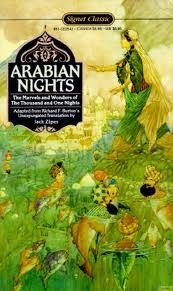
In a work as varied as The Arabian Nights there are naturally some portions more popular than others, probably because some are more easily adapted into standalone tales of adventure. I think we in the West are more familiar with the Nights as a concept than a whole, and many of us have only read or watched adaptions of the most famous of the tales.
Don’t presume that means that the best of the stories have all been filmed and that there is no point reading the rest. There are plenty of excellent, lesser known yarns within, and surely part of the fun of reading the nights is watching the puzzle box interrelation of stories within stories within stories. Admittedly, there are some portions that I don’t like as well and don’t revisit, as with any short story anthology, and many people feel the same, although you’re likely to get a slightly different list of favorites from whomever you speak with.
Today I want to draw attention to one of my favorite sections, “The Wily Dalilah and Her Daughter Zaynab.” If you’ve ever read my musings, you might expect this to be a tale of swashbuckling adventure set in distant locales, swimming with magic rings and djinn and evil wizards. “The Wily Dalilah,” though, is set only in Baghdad, and there is no magic to speak of within the entire story. There are no daring princes with swords, or mysteries, only a clever old woman running a series of con games. Over the course of the narrative, Dalilah, with occasional aid from Zaynab, foments so much trouble in Baghdad that she draws down the attention of the caliph himself.
I’ve encountered fantasy fans who aren’t interested in The Arabian Nights because they assume they will find heaps of sexism within the text. Well, yes… and no. Yes, you will find a patriarchal society, as you will when reading about most ancient cultures. But you will find women instrumental throughout many of the stories, and not just as objects to be won by questing young noblemen. The entire story sequence, remember, is told by a masterful storyteller outwitting a man so that she might live. But there are other prominent women within the story cycle apart from Scheherazade.
My favorite of all of them is Dalilah. Recently rendered destitute and infuriated that two notorious swindlers have been elevated to positions of power within the city of Baghdad, Dalilah launches a campaign to show Baghdad she can out-scoundrel the scoundrels. Through disguise and broad, bold-faced lies, Dalilah scams the unwary in a series of broad, low-comedy schemes. She so enrages the merchants that the police are called in. Captured in the evening, Dalilah goes to sleep near her guards, and the witnesses against her bed down outside. Dalilah wakens, pads past the guards, but, not satisfied with merely escaping, lies to the wife of the police chief and, pointing to the sleeping witnesses, says that she has brought the five mameluke slaves that her husband had asked for. As a result she makes off with a thousand dinars.
Caught again, Dalilah is tied to a post outside the city as punishment, then convinces a foolish Bedouin that she’s been left there because she refuses to eat honeyed fritters. Eager for heaps of the fried dessert, the Bedouin swaps her places. In the morning, the guards, rather than finding an old woman, see a young Bedouin insistently demanding to be given his pastry treats.
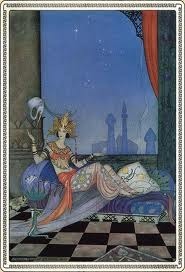 Dalilah continues to wreak mayhem and accrue financial gain. In the end, the only person who can sort out the whole affair is the caliph himself, Haroun al-Rashid. After hearing the whole tale, and after Dalilah has returned the stolen goods and money, he rewards her (and her daughter, who was up to some additional mischief) with higher stations in Baghdad. Dalilah’s late husband had been town captain of the city, and she is appointed in his place, and given stewardship of the caliph’s special inn, which is tended by many slaves and servants.
Dalilah continues to wreak mayhem and accrue financial gain. In the end, the only person who can sort out the whole affair is the caliph himself, Haroun al-Rashid. After hearing the whole tale, and after Dalilah has returned the stolen goods and money, he rewards her (and her daughter, who was up to some additional mischief) with higher stations in Baghdad. Dalilah’s late husband had been town captain of the city, and she is appointed in his place, and given stewardship of the caliph’s special inn, which is tended by many slaves and servants.
There are a lot of ways to read the tale. If you just want to enjoy it for the surface details, it’s guaranteed to raise a few smiles, for Dalilah is genuinely clever and the setups are elaborate and humorous. Yet there’s a subversive air to the text. Dalilah does not gain justice or enrich herself by playing by the rules. She sets out to break the system and call attention to the idiots holding the finances and enforcing the dictates of the government. The wealthy class of merchants and those in positions of power, including their minions the city guards, are made time and time again to look like buffoons — although the country rube and the drug addict don’t escape a few laughs at their expense as well.
I can’t help wondering what the original listeners to the tale were thinking as they heard it. Surely they laughed as the hashish eater went crying through the city for his missing ass, but were they, too, thinking about the disparity of their station and those in the higher echelons of society? Were the women in the audience chuckling as the men fell again and again upon their faces while trying to catch up to Dalilah?
I re-read it from time to time because it’s loaded with great details about the habits of ordinary men and women of the time, complete to an argument between a married couple that both end up, rather touchingly, feeling regret for it. But I also re-read it because it cracks me up.
March 26, 2014
The Business of Writing: Joining the Community
 I spoke to some creative writing students at a local university a while ago and I tried to tell them something it took me a long time to understand: when you begin your writing career, you’re joining a community.
I spoke to some creative writing students at a local university a while ago and I tried to tell them something it took me a long time to understand: when you begin your writing career, you’re joining a community.
By writing career, I mean your first published work. In my case, I was first printed in a ‘zine titled Gauntlet. Before I submitted my story to the magazine, about the only thing I knew about Gauntlet was that it was open to heroic fiction and sword-and-sorcery. I was making a common mistake — I didn’t know the market.
It’s hard to know ALL the markets, especially when, in those bygone days of yore, to know about the magazine you had to buy an issue. (Most of those little magazines couldn’t be leafed through at local bookstores because they weren’t carried.) Today we submitters have it a little simpler because most magazines have web sites where fiction can be sampled. And, of course, an increasingly large number of magazines ARE e-zines.
I may not have known about Gauntlet (long out of print, alas) before I submitted, but when I was accepted for publication, I read the other stories in the same ‘zine with my tale, and found a fair number that I rather liked. Some I liked so well that I wrote the authors, which is how I became friends with Joe McCullough, Barbara Tarbox, and Shauna Bryce. When I was later published by Fraser Roland’s Sword’s Edge e-zine, I struck up a friendship with another writer, Eric Knight, after I read and loved a short story by him in the same issue.
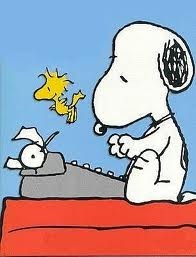 I was reaching out to people because writing is a lonely business and I wanted to meet some kindred spirits. What I didn’t realize was that I was also forming a network of friends and allies, AKA “networking.” I dislike that word, though, because it suggests that one is cold-bloodedly setting forth to make friends to climb the ladder, probably before callously putting them aside for new and better and more powerful contacts as one advances. I realize now that I was becoming part of a writing community.
I was reaching out to people because writing is a lonely business and I wanted to meet some kindred spirits. What I didn’t realize was that I was also forming a network of friends and allies, AKA “networking.” I dislike that word, though, because it suggests that one is cold-bloodedly setting forth to make friends to climb the ladder, probably before callously putting them aside for new and better and more powerful contacts as one advances. I realize now that I was becoming part of a writing community.
Many writers grow up thinking of the writing profession as a noble romantic one, where we sit alone in a tower room with our raven on a bust of Poe and a cat in our lap. Well, okay, I never pictured that, exactly, but I expected that I would write stuff and I just had to send it out until some editor finally printed me, probably sooner rather than later. As I became a regular at various magazines, I realized just how rewarding it was to be exchanging letters with editors and fellow authors and even readers from the various magazines. After I jumped the editorial fence, I started to comprehend that part of what you’re doing with a magazine is helping to build a community of writers and readers.
If my younger self were getting started today and I could somehow communicate with him, I’d tell him to make sure he knew the kind of stories a magazine published and that if he didn’t like those stories, that the magazine probably wouldn’t like his. I’d tell him to submit to a magazine that published stories he liked, and to join in the discussion.
We wouldn’t be working so hard to get published in this genre if we didn’t love the genre, and I can trace a lot of my success back to actually becoming involved in it (I already posted about the exact steps to my book deal a year or two ago). Corresponding with other writers, writing reviews for genre sites, reading slush, writing editorials, editing for ‘zines and magazines. Eventually, a whole lot of people had heard of me, so that I wasn’t a complete unknown when it got to be time to try to promote my books.
I didn’t know that was going to happen — I just couldn’t stay away from fantasy fiction, particularly heroic fiction. But it DID happen, and even though every author’s journey is a little different, surely there’s some lessons from this story some of you out there could find useful.
March 25, 2014
The Fantasy Adventures of Alexander the Great
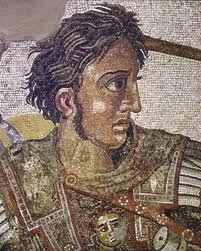 I think my favorite parts of Alexander the Great’s life involve his fight with the dragon, and the time he climbed to a mountain summit and saw the angel of death. Not to mention his conversation with the speaking tree. After that, his meeting with the Emperor of China was almost superfluous.
I think my favorite parts of Alexander the Great’s life involve his fight with the dragon, and the time he climbed to a mountain summit and saw the angel of death. Not to mention his conversation with the speaking tree. After that, his meeting with the Emperor of China was almost superfluous.
I haven’t been dropping acid. I’ve been reading from the Shahnameh, the Persian Book of Kings, an epic poem and a national treasure of Iran, written by Abolqasem Ferdowsi over the course of many decades in the 9th century O.C.E. It purports to tell the history of Persia until the time of the Arab conquest, but what it mostly does is collect fabulous tales of adventure, betrayal, war, and love centered around Persian rulers. And because Alexander the Great came to rule Persia, there’s a long section devoted to him.
Alexander the Great from history and Sekander from the Shannameh have very different lives, and the version told by Ferdowsi reads an awful lot like an abbreviated fantasy epic.
I can’t help wondering what historical sources Ferdowsi had on hand. Mostly he seems to have been working with oral tradition, and to have invented freely from there to address his favorite themes. In the real world, Alexander never reached India. In the Shahnameh, he not only gets to India, he reaches China, not to mention a host of invented countries. Sekander, as he’s known through the Shahnameh, begins life in a similar way as he does in Western histories, complete with his brilliant tutor, Arestalis… except of course that Sekander is really the son of King Darab, father of Darius III, so that Sekander is half-brother to the Persian king he will grow up to slay.
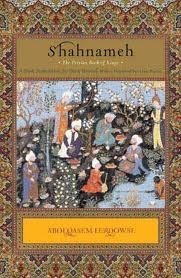 History nerd that I am, when I first read the Shahnameh, particularly the sections with Sekander, the experience was surreal. My enjoyment was hampered by my inability to read Persian and experience the beauty and flow of the original poetry, and by my previous knowledge of the life of Alexander the Great. Yet as I became accustomed to the strangeness, I found grandeur.
History nerd that I am, when I first read the Shahnameh, particularly the sections with Sekander, the experience was surreal. My enjoyment was hampered by my inability to read Persian and experience the beauty and flow of the original poetry, and by my previous knowledge of the life of Alexander the Great. Yet as I became accustomed to the strangeness, I found grandeur.
Ferdowsi didn’t seem to have information about Alexander’s brilliant tactics, or didn’t find them of interest, for we see few real details about actual battles. What we do see is Sekander’s relentless drive to move forward and witness more of this strange and beautiful world. Time and again he pretends to be his own envoy so he can be the first to talk with a new queen or emperor. Time and again he sends forth arrogant letters to kings or queens, then conquers their lands. But Sekander is seen also to rule justly, and from time to time he stops to slay a monster, talk with interesting people, or marvel over some strange landscape. He passes by a great crystal mountain and sees a fish as large as an island. He builds a mighty wall to hold back a horde of monsters, and faces off against a fire-breathing dragon.
As he nears the end of his journey, Sekander is told more and more often that he has seen more than a fair share of marvels allotted to any man, and that his time of rule is almost through. The further Sekander pushes on, the more ominous these warnings become, until at last a heartsick Sekander returns to Babylon to die.
As in real life, the mourning for Sekander is incredible, and nearly a hundred thousand come to view his coffin, including the philosopher Arestalis and other Greek sages. But Ferdowsi allows Sekander’s mother the most powerful words:
You seemed a storm cloud charged with hail: I said
That you could never die, that you had shed
So much blood, fought so many wars, that there
Must be some secret you would not declare,
Some talisman that fate had given you
To keep you safe whatever you might do.
You cleared the world of petty kings, brought down
Into the dirt an empire’s ancient crown,
And when the tree you’d planted was to bear
Its fruits you died, and left me in despair.

A statue of Ferdowsi in the square named after him, in Tehran.
Ferdowsi himself concludes the saga with words that first struck me as bleak – and then I realized he was celebrating the power of the pen over the sword: “Sekander departed, and what remains of him now is the words we say about him. He killed thirty-six kings, but look how much of the world remained in his grasp when he died. He founded ten prosperous cities, and those cities are now reed beds. He sought things that no man has ever sought, and what remains of him within the circle of the horizon is words, nothing more. Words are the better portion, since they do not decay as an old building decays in the snow and rain.”
Ferdowsi was fascinated by the habits of a good and just ruler. Sekander is painted as a man with the instincts of justice, colored by arrogance and greedy not for gold, but the next adventure. His is a tale of philosophy shot through with vivid imagery and adventure. I was allowed entry into his world via the recent translation of the Shahnameh by Dick Davis, who gives a fascinating “behind-the-scenes”. Anyone remotely curious about reading the Shahnameh should visit to see Davis’s description of the work, his approach, and his favorite characters. It would be impossible to effectively translate the whole of the poem from Persian into English, which is why Dick Davis mostly converted the work into prose.
I found Sekander’s adventure, and the whole book, fascinating. Highly recommended, with my usual caveat about tales of myth and legend, east or west. Characters do not always act consistently, minor characters appear and disappear and may be poorly developed, and sometimes the thread of the story seems lost in digression over details that do not interest modern readers. It is not a book to be devoured in a couple of long sessions, but a masterpiece to be considered slowly, and revisited.
March 22, 2014
Crossing The Streams
Another Crossing the Streams contest has ended. I’ve chosen my favorite entry, randomly selected another, and sent all entries over to Ari Marmell, who will pull one at random so that one lucky person will get one free book from ALL of the authors in the contest. That grand prize winner will be announced next week some time.
To enter my contest you had to name your favorite sword-and-sorcery/heroic fiction novel/story that has NOT been made into a movie, and explain why it should happen.
Through those entries I read about a lot of work I’d never heard of, and I read about some suggestions I happento agree should long ago have been made into movies… although no one mentioned The Chronicles of Amber, which I personally feel should be converted into a trilogy as soon as possible. I can’t believe it hasn’t happened yet. Oh, if it does, can I PLEASE be involved in the script writing? Even if I’m just like the xerox boy?
There might be a little more radio silence for the next few days as I bear down hard on a writing project. Maybe I’ll set up a few more article reprints…
March 19, 2014
Stalking the Links
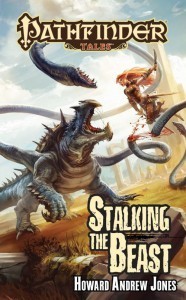 I’m back today, but mostly with links because there is much to be done.
I’m back today, but mostly with links because there is much to be done.
First, I wanted to point everyone to a wonderful review of Stalking the Beast that popped up at Black Gate. I haven’t been much involved with the magazine site for quite a while, so I had no idea that this review was coming up, or that it had even been planned. Writer Nick Ozment seemed to love the book, which pleases me mightily.
Sometimes people don’t like things you write for understandable reasons, and sometimes they don’t like things you write because they apply their own assumptions to it (not being familiar with an unreliable narrator, say, or not knowing the difference between an info dump and an Arabian Nights story-within-a-story ).
But sometimes a reviewer finds exactly what you were hoping a reader would take away from your work and then explains it cogently, and that’s what Nick Ozment did.
My second link today comes from the talented Myke Cole. He wrote eloquently on the subject of killing, specifically how being a warrior who kills effects people and how rarely that realistically impacts those characters who kill in modern fantasy fiction. It is definitely worth a read, but then so is Myke’s work.
Third, a link to one of Amy Sundberg’s excellent essays. I make a regular habit of dropping by her site and reading what she’s thinking about/doing,
[image error]
The only place to find “Zingazar.”
but I don’t know that I’ve ever directly pointed any of my regular visitors her way. Go poke around a bit. You’ll find lots of brilliant writing there.
Last, there’s over at Black Gate today, courtesy of the insightful Fletcher Vredenburg. I always thought Kellory the Warlock was a decent read, a standout for Carter, although I happen to agree with sword-and-sorcery scholar Morgan Holmes that Lost World of Time is even better.
I also agree with Jessica Amanda Salmonson that Carter’s “Zingazar” is just a great little piece of work. She briefly mentions it in a remembrance at the bottom of this Haggard essay. “Zingazar” may be the one piece of Carter’s fiction that should be essential reading for the sword-and-sorcery fan. I know it’s basically a recasting of “The Sword of Welleran,” but I think — and I admit this is heresy — that this one time Carter outdid Lord Dunsany.
I still think a nice little omnibus of Carter’s best work would be a good thing for all sword-and-sorcery fans to have. I’d love to edit one with Morgan Holmes, who seems to hold most of my same opinions re: Carter’s fiction. Most of the short Thongor stories are head and shoulders above the other Clonans, and better than the Thongor books, and some of his faux Clark Ashton Smith pieces are kind of fun as well. Package those up with some of his imitation Dunsany, Lost Worlds of Time, and Kellory the Warlock, and you’d have a nice collection.
March 14, 2014
The Skill of Asking
This morning I’m turning my blog over to the talented Suzanne Church. I was first introduced to Suzanne in 2011 at DragonCon by John O’Neill, and found her witty and extremely kind, but I had no idea what a fine writer she was until I attended one of her readings at the 2012 WorldCon. I’ve been a fan ever since and have made sure to attend every single one of her readings at any convention where we’re both in attendance. I went out of my way to track down several anthologies just to have copies of her work, and I’m excited to learn about her new short story collection.
Anyway, take it away Suzanne!
——————————–
When I was a kid, my mother used to say, “All you have to do is ask.”
The courage to ask is a powerful tool for any writer to keep in their
skills toolbox for promotion, research, and critiques.
Promotion
Attending conventions that celebrate your genre of writing can boost your career as well as motivate you to write. Ask the programming committee if you can speak on a panel or do a reading to expose more readers to your work.
Right now I’m deep in the process of promoting ELEMENTS: A Collection of Speculative Fiction. Part of that promotion has involved an endless stream of opportunities to ask.
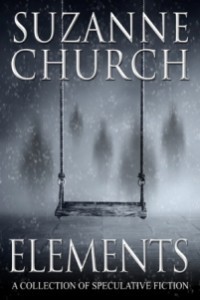 I asked several bookstores to host launches for the book. All of them said yes.
I asked several bookstores to host launches for the book. All of them said yes.
I asked several radio stations for the opportunity to talk about my book and writing on air. I’ve had nothing but positive feedback so far.
I asked several bloggers to allow me to post on their blogs and vice versa. Lucky for me, many authors like Howard agreed. Thanks, Howard!
Research
A big component in the writing process is the research of setting locations, character occupations, and plot events. The more accurate the details of your book, the richer the adventure will feel to your readers.
In many jurisdictions writers can apply for travel grants to either research the location where the story is set or to attend a convention to promote the book. Check out the arts council websites in your city, state/province, and country to ask if you qualify for this type of grant.
Is one of your characters a police officer? Ask at the local police station to interview an officer with the same rank working in the same department.
Does the sun cycle into the red giant phase in your story? Ask a physicist if you’ve written the scientific details accurately.
Critiques
Writers need feedback on their work, especially when immersed in the editing phase.
One of my writers’ groups, the Stop-Watch Gang has a strict rule during critique sessions.
The person doing the crit has only five minutes for their comments. No one else is allowed to interrupt (including the writer in the hot seat, having their story critiqued). One of the most informative parts of the meetings happens after, when the person in the hot seat can ask follow-up questions and plot-noodle about new directions the story can take.
If you don’t belong to a writers’ group, ask about writers-on-the-lookout at your local library or favorite bookstore.
To sum up, asking is sometimes difficult, but if you hone your asking skills you’ll reap the benefits in every aspect of your writing career.
Suzanne Church juggles her time between throwing her characters to the lions and chillin’ like a villain with her two sons. She writes Science Fiction, Fantasy, and Horror because she enjoys them all and hates to play favorites. Her award-winning fiction has appeared in Clarkesworld, Cicada and On Spec, and in several anthologies including Urban Green Man and When the Hero Comes Home 2. Her book ELEMENTS: A Collection of Speculative Fiction is
available at bookstores (April 1 in Canada and April 30 in the US) and Amazon
from EDGE Science Fiction and Fantasy Publishing.
March 12, 2014
Under the Hood with Robert E. Howard
I remain in the literary salt mines this week, so I’m reprinting an article I wrote for Black Gate back in 2012.
 When I tell people what a great writer Robert E. Howard was, a lot of them don’t seem to believe me. If they only know him through depictions of Conan or, worse, rip-offs, then they think Howard’s writing is all about a dull guy in a loin cloth fighting monsters and lots of straining bosoms. It’s not that Robert E. Howard thought himself above describing a lithesome waist or a wilting beauty, especially if he needed to make a quick buck, it’s just that there’s a lot more going on in a Conan story than his imitators took away.
When I tell people what a great writer Robert E. Howard was, a lot of them don’t seem to believe me. If they only know him through depictions of Conan or, worse, rip-offs, then they think Howard’s writing is all about a dull guy in a loin cloth fighting monsters and lots of straining bosoms. It’s not that Robert E. Howard thought himself above describing a lithesome waist or a wilting beauty, especially if he needed to make a quick buck, it’s just that there’s a lot more going on in a Conan story than his imitators took away.
It’s easy to pull some samples of great action writing from Robert E. Howard. I’ve done it before, and I could easily do it again here. Only a handful of writers can approach him in that field, and almost none are his equal.
He was also a master of headlong, driving pace. That can be hard to showcase without insisting you read an entire story, so today I want to show readers who seem unaware of his work (or those who are uninterested) a few more reasons why those of us in the know revere him so highly.
Here in one of his historical stories, ”Lord of Samarcand,” is the Scotsman, or Frank, as the easterners call any from Europe, Donald MacDeesa, riding to the court of Tamarlane the Great. See how swiftly, how easily, Howard conjures the scene in all its splendor with just a few well-chosen words, as though he’s panning a camera as MacDeesa rides.
The Frank’s wonder grew; the cities of the West were hovels compared to this. Past academies, libraries, and pleasure-pavilions they rode, and Ak Boga turned into a wide gateway, guarded by silver lions. There they gave their steeds into the hands of silk-sashed grooms, and walked along a winding avenue paved with marble and lined with slim green trees. The Scotsman, looking between the slender trunks, saw shimmering expanses of roses, cherry trees and waving exotic blossoms unknown to him, where fountains jetted arches of silver spray. So they came to the palace, gleaming blue and gold in the sunlight, passed between tall marble columns and entered the chambers with their gilt-worked arched doorways, and walls decorated with delicate paintings of Persian and Cathayan artists, and the gold tissue and silver work of Indian artistry (Howard, 89).
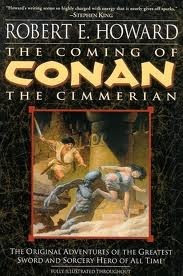 Howard had far more range and depth than his detractors ever want to give him, and he created many compelling characters. But let’s turn our attention back to Howard’s most famous creation, Conan, because I mean to show you that he’s more than is assumed from the usual portrayals.
Howard had far more range and depth than his detractors ever want to give him, and he created many compelling characters. But let’s turn our attention back to Howard’s most famous creation, Conan, because I mean to show you that he’s more than is assumed from the usual portrayals.
First, he’s not unstoppable and unchangeable, nor did he stride forward into his first adventures with the same skilled confidence he evidences in stories set later. He is powerful and courageous in “The Tower of the Elephant,” but he is new to cities, as these two excerpts show.
The Cimmerian glared about, embarrassed at the roar of mocking laughter that greeted this remark. He saw no particular humor in it, and was too new to civilization to understand its discourtesies. Civilized men are more discourteous than savages because they know they can be impolite without having their skulls split, as a general thing (31).
He had entered the part of the city reserved for the temples. On all sides of him they glittered white in the starlight – snowy marble pillars and golden domes and silver arches, shrines of Zamora’s myriad strange gods. He did not trouble his head about them; he knew that Zamora’s religion, like all things of a civilized, long-settled people, was intricate and complex, and had lost most of the pristine essence in a maze of formula and rituals. He had squatted for hours in the courtyards of the philosophers, listening to the arguments of theologians and teachers, and come away in a haze of bewilderment, sure of only one thing, and that, that they were all touched in the head.
His gods were simple and understandable; Crom was their chief, and he lived on a great mountain, whence he sent forth dooms and death. It was useless to call on Crom, because he was a gloomy, savage god, and he hated weaklings. But he gave a man courage at birth, and the will and might to kill his enemies, which, in the Cimmerian’s mind, was all any god should be expected to do (32).
Here, later in the same story, Conan and the master thief Taurus are scaling a tower where they seek a fabulous treasure. Feast ye upon the glorious description:
The cord swayed and turned on itself, but the climbers were not hindered; both had made more difficult climbs before. The jeweled rim glittered high above them, jutting out from the perpendicular of the wall, so that the cord hung perhaps a foot from the side of the tower – a fact which added greatly to the ease of the ascent.
Up and up they went, silently, the lights of the city spreading out further and further to their sight as they climbed, the stars above them more and more dimmed by the glitter of the jewels along the rim. Now Taurus reached up a hand and gripped the rim itself, pulling himself up and over. Conan paused a moment on the very edge, fascinated by the great frosty jewels whose gleams dazzled his eyes – diamonds, rubies, emeralds, sapphires, turquoises, moonstones, set thick as stars in the shimmering silver. At a distance their different gleams had seemed to merge into a pulsing white glare; but now, at close range, they shimmered with a million rainbow tints and lights, hypnotizing him with their scintillations (39).
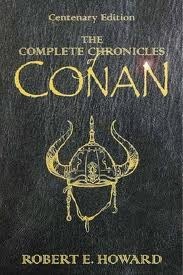 In the sword-and-sorcery clonans that followed the Cimmerian’s footsteps, there was little variety and less depth. But Conan does not stride forward, unthinking, and hack everything before him. Here he comes upon a chamber where he hoped to find the treasure, and finds instead a frightening, humanoid monster. On the off chance you’ve never read this story — because you should, and I don’t want to spoil it for you — I’m cutting most of its description, and just showing you Conan as he realizes humans have blinded and imprisoned this being.
In the sword-and-sorcery clonans that followed the Cimmerian’s footsteps, there was little variety and less depth. But Conan does not stride forward, unthinking, and hack everything before him. Here he comes upon a chamber where he hoped to find the treasure, and finds instead a frightening, humanoid monster. On the off chance you’ve never read this story — because you should, and I don’t want to spoil it for you — I’m cutting most of its description, and just showing you Conan as he realizes humans have blinded and imprisoned this being.
…and Conan’s gaze strayed to the limbs stretched on the marble couch. And he knew the monster would not rise to attack him. He knew the marks of the rack, and the searing brand of the flame, and tough-souled as he was, he stood aghast at the ruined deformities which his reason told him had once been limbs as comely as his own. And suddenly all fear and repulsion went from him, to be replaced by a great pity. What this monster was, Conan could not know, but the evidences of its sufferings were so terrible and pathetic that a strange aching sadness came over the Cimmerian, he knew not why. He only felt that he was looking upon a cosmic tragedy, and he shrank with shame, as if the guilt of a whole race were laid upon him (45).
Howard seldom failed to entertain, and at his best, he was not just good, he was great – he stands as one of the best adventure writers we’ve ever had. There is much to be gleaned from his craft, and much enjoyment to be found in his writing. If you’re exploring for the first time though, you’ll have to make allowances for conventions from Howard’s time, which means some sexism or racism – although, as Howard does not himself seem to have been racist or sexist, you’ll also come upon depictions of women and non-whites that defy stereotypes. Sometimes there are also the usual genre conventions you’ll encounter from magazine fiction of the period; shorter stories, for one, and the use sometimes of a villain monologue or an info dump through conversation to move the plot ahead. Yet even when these aspects are there, Howard’s strengths drive the story forward.
If you’re new to him, I’d suggest the new Del Rey trade paperback, The Best of Robert E. Howard Volume 2, Grim Lands, from which all these excerpts were taken, although if you want Conan alone, any one of the three Del Rey Conan volumes will see you in good stead.
March 11, 2014
Catching Up

Howard and Saladin put their heads together.
I am crazy busy with book deadlines right now, so there’s apt to be some radio silence.
I did want to remind everyone about the Crossing the Streams contest, which is still under way. Bop over there now for a chance to win a free copy of not only a book from me, but scads more authors besides.
My Dabir and Asim stories, as well as the historical fiction of Harold Lamb and the fantasy work of Saladin Ahmed, got a call-out along with some fine fiction in a wonderful article on Silk Road Fantasy by Paul Weimer over at SF Signal yesterday.
Lastly, I sort of have a new Welcome page that newcomers might have missed. Being so busy with, you know, writing, I haven’t had time to reorganize the site so it’s easier to find. Perhaps I’ll pin it up top eventually. Anyway, it has links to many of my favorite posts, and you can find it here.
March 5, 2014
Self-Sabotage is Easier than Writing
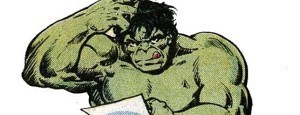 A lot of writers I know are pretty good at self-sabotage. It’s not that writing is hard, exactly, except that it is. Physical labor and exercise isn’t required, and it sure doesn’t look like you’re doing much when you’re staring at that screen and pecking away at a keyboard. But getting good work, consistently, means constant effort. And constant effort = work.
A lot of writers I know are pretty good at self-sabotage. It’s not that writing is hard, exactly, except that it is. Physical labor and exercise isn’t required, and it sure doesn’t look like you’re doing much when you’re staring at that screen and pecking away at a keyboard. But getting good work, consistently, means constant effort. And constant effort = work.
I’d like to have those moments where an entire chapter writes itself and stays virtually unchanged through every draft because I can hear, see, and picture it so clearly the first time; but it just doesn’t happen very often. The trick is sticking with the process so that the reader can’t tell which chapters you labored over and which chapters flowed naturally the first time. And that takes time, and effort, and sometimes it’s easier to do nothing.
I’ve learned different ways to practice self sabotage over the years, and different ways to fight my tendencies. I know that the best way to get started every day is to allow myself a transitional moment – check a couple of e-mails and respond to two, say, or play a game of mine-sweeper, and then get to business. It is so, so, so much easier to notwrite than it is to write, and it’s incredibly easy to go to a news site, check a few headlines, then notice a few other interesting articles while you’re reading those, then have those articles remind you that you never knew what year Green Lantern was invented, or how many drummers the Rolling Stones had or some other tidbit completely unrelated to anything productive you need to get done.
 Steven Pressfield’s excellent book on Writing, The War of Art, calls this Resistance. Different writing tips work better for different writers because we all have varied strengths and weaknesses, but I found Presfield’s book a revelation, and swore that I would defeat the enemy now that I understood it. Unfortunately, you never vanquish Resistance. It’s like that damned fox from Dora the Explorer. If you’re not looking, your time is swiped, and it’s your own fault. You just have to stay vigilant. One of the ways I stay vigilant is with the Dr. McCoy test, but you may have your own methods.
Steven Pressfield’s excellent book on Writing, The War of Art, calls this Resistance. Different writing tips work better for different writers because we all have varied strengths and weaknesses, but I found Presfield’s book a revelation, and swore that I would defeat the enemy now that I understood it. Unfortunately, you never vanquish Resistance. It’s like that damned fox from Dora the Explorer. If you’re not looking, your time is swiped, and it’s your own fault. You just have to stay vigilant. One of the ways I stay vigilant is with the Dr. McCoy test, but you may have your own methods.
That’s an old enemy, and an old battle. It was my wife who showed me I was battling another. Two years ago I woke up one Saturday and sat down to revise the first chapter of the third Dabir and Asim novel. When I woke my wife a few hours later (as requested, so we’d arrive for an appointment) she asked how things had gone, and I told her that I’d finished another pass on chapter 1, and that I was really looking forward to getting back to writing new chapters. She thought about my response for a while, then asked why I was always excited when I made progress on the rough draft, but not pleased when I revised it. She pointed out that being excited about 2000 words when 1000 of them might change was sort of delusional, whereas being pleased when a chapter started to sound good might be more healthy.
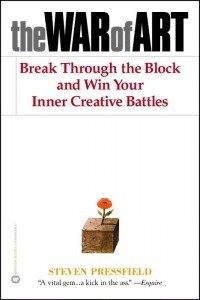 She’s a wise lady, and so I mulled that over. I always allow myself a feel good moment when I meet my daily minimum word count, so why didn’t I pat myself on the back that morning when I wrestled chapter 1 into near final condition?
She’s a wise lady, and so I mulled that over. I always allow myself a feel good moment when I meet my daily minimum word count, so why didn’t I pat myself on the back that morning when I wrestled chapter 1 into near final condition?
I thought of four reasons.
For years, revising was easier for me than drafting, so I’ve trained myself to be more excited when drafting goes well.
Long ago I used to stop after a few chapters and revise and revise until I’d get sick and give up completely, and I swore I wouldn’t do that anymore.
It feels better to have the work approaching the completed stage, especially when you’re under deadline.
It is challenging to switch gears between rough draft and revising.
They all make sense to me, but they’re all excuses. With a good outline in hand, drafting is no longer as challenging. I’ve long since given up the bad practice of “looping” over and over and then giving up. The other two are states of mind.
So what’s to be done?
When I originally wrote this article in 2012 (at Black Gate), I wasn’t sure. I answered that question with: “I’m not completely sure, but I have a plan in mind. The next time I’m feeling grumbly that I’m not making progress, I’ll try to remember that there are different ways to measure it.”
The plan worked. I allow myself to feel good as long as I’m making progress. And as I mentioned yesterday, a lot of it has to do with two things: my new outlining process and the simple matter of acquired experience. Some writers acquire that experience faster than I did — and more power to them — but I seem to have it now.
There’s a third thing, though. And that’s to be kinder to myself as a writer. I don’t mean to say to be arrogant, or non-critical. You always have to be your first critic. But I’ve allowed myself to celebrate, a little, when I get a chapter sounding right, or when I come up with a phrase that pleases me. There seem to be an endless supply of people out there waiting to tear you down for reasons that may or may not have any basis in reality, so why go out of your way to beat your own writing up?
Right, well, off the soapbox and back to work. Horses to feed, breakfast to eat, words to write.
Howard Andrew Jones's Blog
- Howard Andrew Jones's profile
- 368 followers




